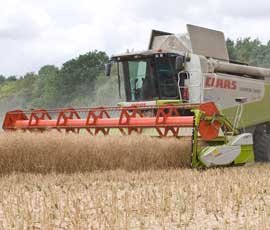Rotational intensity can affect OSR yield

The effect of rotational intensity of oilseed rape has been quantified in new research, which shows yields can decline by nearly 20%.
Data from multiple seasons in a HGCA-funded trial at Morley Farm, Norfolk, suggested a reduction in yield of about 12% for a high-intensity OSR rotation, with wheat alternating with oilseed, compared with first oilseed rape crops.
Similar analysis suggested an 18% yield reduction when comparing continuous oilseed rape with the first oilseed crop grown.
According to the NIAB TAG report, an extension of these findings, based on the same criteria, would suggest yield losses of about 3% for a three-year gap and a 6% field loss for a two-year gap.
The decline would be influenced by a number of factors, with the presence of volunteers being highlighted as a key aspect, producing direct competition, varietal dilution and increased risk of disease.
More from the Crop Protection in Southern Britain Conference
Spring cropping can slash blackgrass
Clethodim could add to blackgrass armoury
Product choice key in reducing fusarium ear blight

